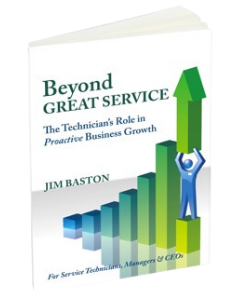The Limiting Reality of Getting Technicians to “Sell” – 4 Reasons Why
 How we define the world impacts our perception of it. How we define our technicians’ role in promoting our services is no exception. This blog post is about the limiting reality of getting technicians to “sell” and the 4 reasons why this is the case.
How we define the world impacts our perception of it. How we define our technicians’ role in promoting our services is no exception. This blog post is about the limiting reality of getting technicians to “sell” and the 4 reasons why this is the case.
Maslow is attributed as saying, “If you only have a hammer, you tend to see every problem as a nail.” This sentiment applies to how we view the role of service technicians. If we see the proactive efforts of technicians to identify and speak to the customer about our services as that of a “salesperson” then everything they do in this regard looks like “selling”. Unfortunately, this viewpoint greatly limits our imagination to capture the real value in what our technicians are providing. This constrains our ability to capitalize on these efforts as a valuable and differentiated service offering.
In my opinion, a technician who feels – based on their knowledge and experience – that the customer would benefit from a particular product or service in some way, and brings this to the attention of the customer is providing a service and is not selling. It is part of their job – as important as their ability to fix or maintain the equipment itself. In fact, I suggest that they have an obligation to the customer to discuss any action that would be of benefit to their operations.
Despite this, many service managers I speak to as well as several in the training and consulting community, talk about this activity as “selling” by technicians. Here are the 4 reasons why this viewpoint will significantly limit our success.
- Opportunistic/Short-term Focus. As I mentioned in my last blog, when the proactive recommendations by our technicians are seen as selling they become “add-on” activities and we tend to see them from an opportunistic perspective. “While you’re there have a look for other things that we can sell to that customer.” This misses the opportunity to imbed this activity into our overall service strategy.
- Skills Development is Focused on Selling. When we view the activity by our technicians as selling in nature, then it is natural to look to sales training to upgrade the skills of our technicians to handle the new expectations. Although these are important skills and can be helpful in many cases, they aren’t the only skills or even the most important. The technicians’ ability to build trust and maintain credibility is more important. Unfortunately, if we simply teach our technicians to sell, they may come across more like salespeople and actually diminish the amount of trust they have with their customers.
- Measurement is Limited to Selling Activities. When we regard the technician’s role as selling, then we will tend to limit our measurement of the success of the initiative to factors such as overall revenues, small project work vs. contract base, number of proposals by technician, etc. Although it is prudent to measure these things, this limited focus may cause us to miss key measures that will impact our long-term success. It may also cause us to reward certain activities that may encourage unnecessary “selling” activities that may also erode trust.
- Difficult to Promote as a Differentiating Service. Many service companies that view service technicians’ proactive efforts as “selling” fail to capture and communicate the value of this activity to their customers. These firms typically don’t mention to their customers that they are encouraging their technicians to look for more opportunities. After all, how do you communicate the value from the customers’ perspective of the fact that your technicians are actively looking for more ways to make more money from them?
Next time we will look at changing our perspective of the proactive activities of our technicians from that of selling to serving and how that simple change in mindset can have a enormous impact on our ability to deliver a differentiated (and valued) service experience.
I welcome your feedback. You can connect with me via telephone or email or leave a comment right here on the site. And as always, please feel free to leave a link back to your own blog if you have one via the commentluv feature here on the site. If you are reading this blog post via email, you will need to locate this post on my website by clicking here. Scroll down to the bottom of the page where you will find the comment section.
Jim
“If you only have a hammer, you tend to see every problem as a nail.”
– Abraham Maslow




Leave a Reply
Want to join the discussion?Feel free to contribute!